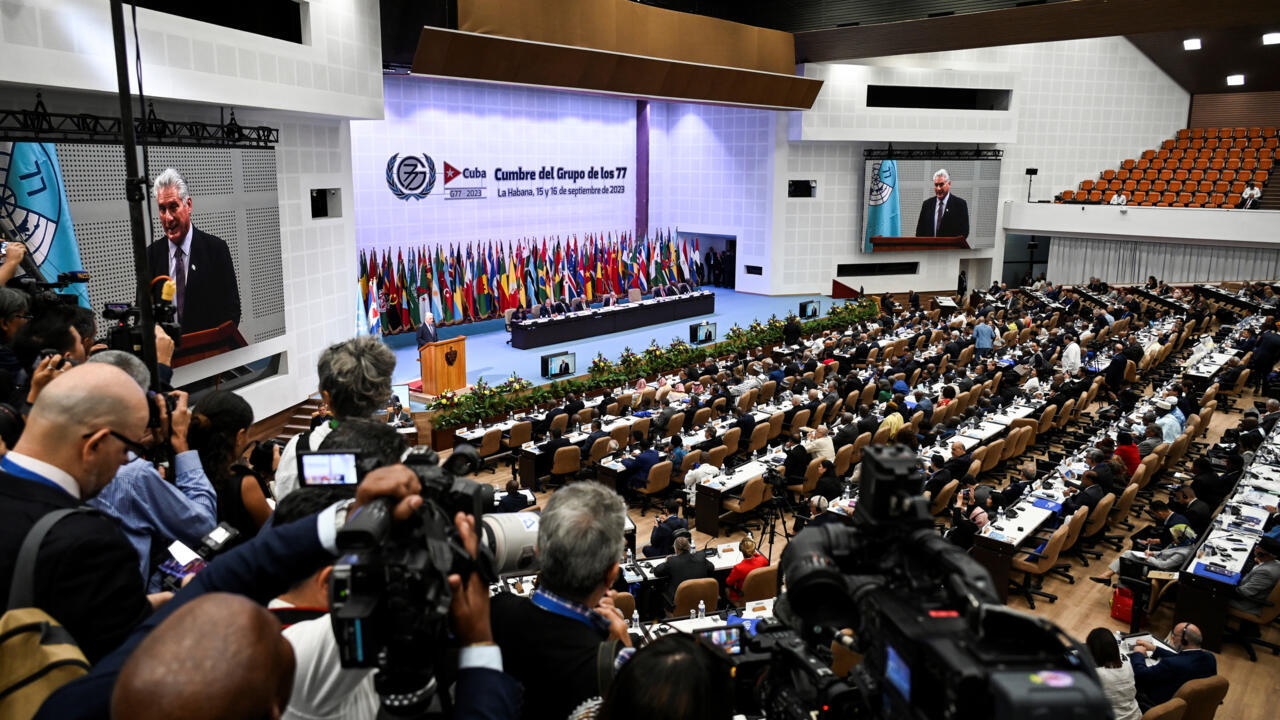About thirty heads of state and government are participating in the two-day summit, including Argentine President Alberto Fernandez, Colombian Gustavo Petro, Angolan João Lourenço, Mozambican Filipe Nyusi, Rwandan Paul Kagame, the Emir of Qatar, Sheikh Tamim bin Hamad Al Thani and Palestinian President Mahmoud Abbas.
Brazilian President Luiz Inacio Lula da Silva arrived in the Cuban capital in the evening.
"After all the time that the North has organized the world according to its interests, it is now up to the South to change the rules of the game," Cuban President Miguel Díaz-Canel, whose country has held the group's rotating presidency since January, said at the opening of the summit.
The leader stressed that developing countries are the main victims of "the current multidimensional crisis in the world", "cyclical disruptions in trade, international finance and unequal trade", as well as global warming.
Brazilian President Luiz Inacio Lula da Silva gets off the plane at Havana's Jose Marti International Airport on September 15, 2023, to attend the G77+China © summit YAMIL LAGE / AFP
He condemned an "international architecture" that is "hostile to progress" in the countries of the South.
UN Secretary-General Antonio Guterres, who is attending the summit, called for a world that is "more representative and more responsive to the needs of developing economies," stressing that these countries were "trapped in a tangle of global crises."
"Public funds"
Representatives of a hundred countries are present in Havana for this extraordinary summit on the theme "Role of Science, Technology and Innovation" in Development. On this occasion, the UN chief congratulated Cuba on the development of vaccines against Covid-19.
The Group, established in 1964 by 77 countries, now has 134 nations. China participates as an external player.
Its representative, Li Xi, a member of the Standing Committee of the Political Bureau of the Communist Party of China, stressed in his speech the importance of "South-South cooperation", while several speakers spoke of the global inequalities exposed by the Covid-19 pandemic and the need to reduce the debt of the poorest countries to finance the climate transition.
Cuban President Miguel Diaz Canel (R) greets Li Xi, member of the Standing Committee of the Politburo of the Communist Party of China, as he arrives at the Havana Convention Center, September 15, 2023 © Yamil LAGE / POOL / AFP
"The burden of external debt, market volatility, difficulties with internet access and climate change are serious obstacles to the progress of our nations," Angolan President João Lourenço said.
Colombian President Gustavo Petro proposed "universal negotiation" to reduce the debt of poor countries in order to release "public funds that allow us to pay for the transition to a low-carbon economy".
His Argentine counterpart said that the countries of the South now had a "huge opportunity to demand equality". "It is in the global South that the central world needs," Fernandez said, referring to the richest countries. "He needs food that is happening in South America ... it needs energies that are in Arab countries (...) it needs lithium" from South America.
In July, the UN chief told the press that the "G77 is the voice of the global South, the largest group of countries on the international scene", stressing that the "multiplicity of summits" international in different regions of the world "reflects the growing multipolarity of our world".
Former Cuban President Raul Castro (R) and UN Secretary-General Antonio Guterres attend the inaugural session of the G77+China Summit at the Palais des Congrès in Havana, September 15, 2023 © ADALBERTO ROQUE / AFP
In recent weeks, Mr. Guterres has visited the BRICS summit (Brazil, Russia, India, China and South Africa, soon to be extended to six new members) in Johannesburg and the G20, a group of the world's most powerful economies, in New Delhi.
The organization of this summit allows Cuba to demonstrate its diplomatic capacity, despite the economic difficulties that shake the communist country. A slow recovery from the pandemic, tighter sanctions from Washington -- which has imposed an embargo on Havana since 1962 -- and internal structural weaknesses have plunged the country into a serious crisis.
© 2023 AFP

